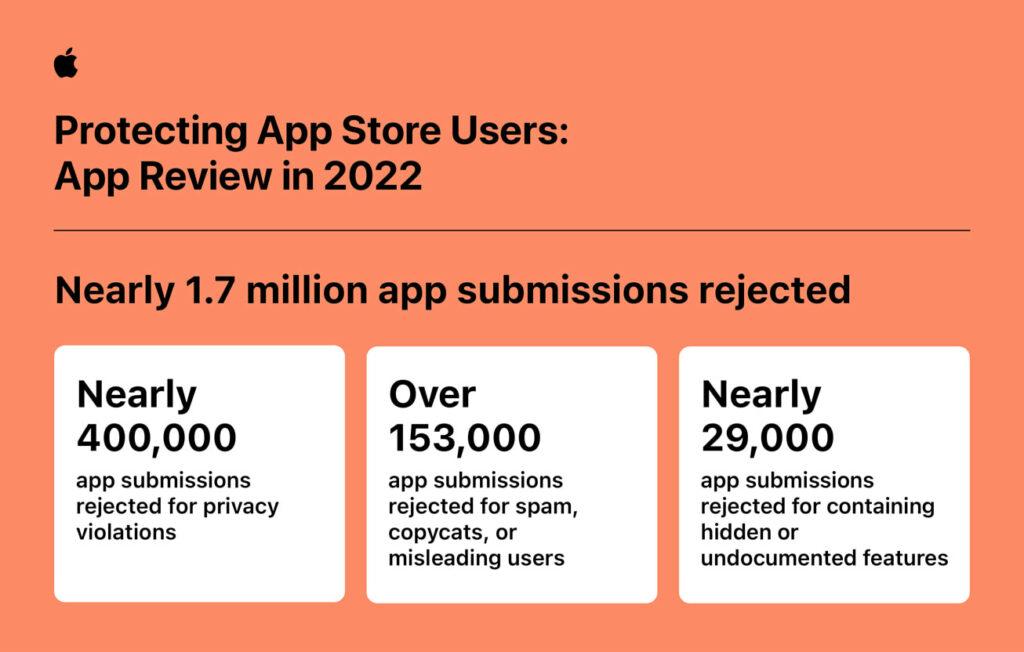The Apple App Store stands as the preeminent global platform for iOS app downloads, garnering unparalleled popularity and widespread adoption. In the first quarter of 2023, a staggering 9.1 billion apps were collectively downloaded by iPhone and iPad users from the App Store, showcasing a noteworthy 12% year-over-year growth. Since its establishment in 2008, Apple has continuously implemented a multitude of privacy and security measures to safeguard its robust app ecosystem, promoting the welfare of both users and developers alike. As a result, in 2022 alone, approximately 1.7 million app submissions were rejected from the App Store, predominantly due to concerns regarding fraudulent activities and privacy-related matters.
Presently, the Apple App Store boasts an impressive array of statistics, with over 36 million registered Apple developers and an average of over 650 million weekly visitors worldwide. Its impressive reach encompasses support for more than 195 local payment methods and seamless transactions in 44 diverse currencies, ensuring a globally harmonized experience for users and developers alike.

Apple removed fraud accounts in 2022
Over the past few years, Apple, Inc. (NASDAQ: AAPL) has made significant strides in enhancing its systems to establish a robust and proactive account fraud detection mechanism. These advancements underscore Apple’s steadfast dedication to preventing fraudulent activities and upholding a secure ecosystem for both users and developers of the App Store.
- In 2022, Apple successfully identified and terminated 428,000 developer accounts suspected of engaging in potentially fraudulent activity.
- There was a remarkable 46.6% YoY decline in the number of developer accounts removed from the App Store in 2022 compared to the previous year. To provide context, in 2021, the App Store terminated over 802,000 developer accounts.
- Approximately 105,000 enrolments into the Apple Developer Program were rejected due to suspicions of fraudulent activities. This proactive measure effectively prevented bad actors from submitting their apps to the App Store.
- In 2022, Apple removed nearly 57,000 untrustworthy apps originating from illegitimate storefronts.
- In its ongoing efforts to address fraudulent and abusive activity, Apple actively takes measures against fraudulent customer accounts. In 2022 alone, Apple took action by disabling more than 282 million customer accounts found to be associated with such activities.
Apple blocked fraudulent transactions on App Store
Over time, there has been a significant shift towards digital payments as a preferred method of purchasing goods and services. Interestingly, Apple has been making substantial investments in developing secure payment technologies, such as Apple Pay and StoreKit, aimed at safeguarding its users’ financial information. Nearly 943,000 iOS apps use these advanced technologies to sell goods and services on the App Store.
- In 2022, Apple demonstrated a solid commitment to combating fraudulent activities on the App Store by blocking a remarkable $2.09 billion in fraudulent transactions.
- In 2022, Apple took significant measures to safeguard its iPhone and iPad users from credit card fraud, which is looming large with each passing year in the digital world. Approximately 3.9 million stolen credit cards were barred from being used to make fraudulent purchases on the App Store.
In a nutshell
Apple has been unwavering in its commitment to maintaining the App Store as the epitome of security and trustworthiness for iOS device users and developers. To accomplish this, the company has implemented a meticulous and comprehensive evaluation process, subjecting every app to rigorous safety checks before granting access to the App Store.
On a weekly basis, the dedicated App Store team diligently reviews an average of over 100,000 app submissions, with nearly 90% of them undergoing meticulous examination within a 24-hour timeframe. This rigorous review process ensures that each app available on the App Store adheres to Apple’s stringent standards, further fortifying the platform’s overall security and dependability.

